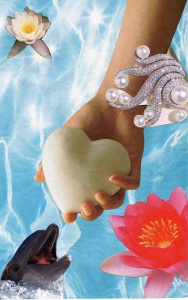Forty-eight things I’ve learned along the way
Nora Ephron famously felt bad about her neck (though hopefully she no longer does). I do not, despite having the sort of neck not found on any swan, the sort of neck not flattered by a flaw-concealing turtleneck.
In those moments when I could be feeling bad about my neck, I instead choose to feel good about the head sitting on top of it–specifically the many contents that were missing in the days when the neck beneath was flawless.
In honor of my birthday, a list of 48 random things I’ve learned thus far. (Links are mostly to previous blog posts.)
- How to choose my battles. It’s amazing when I think about it now, how many (unimportant) things I was once willing to pitch battle for.
- Being able to recognize my ego’s involvement has really made all the difference. At least 99% of the time, that’s what the battle was really about.
- Compassion is a great thing to have on hand when your own or someone else’s ego flares up.
- Kindness is also pretty important. Even when you need to draw a boundary firmly, it’s generally possible to do it with kindness.
- How to forgive continually.
- And how to release bitterness–also key.
- I used to think being smart was a lot more important than it really is. It’s nice, sure, but far from the most important thing.
- Love–that would be the most important thing.
- “There is no fear in love; but perfect love casteth out fear …” (I John 4:18, KJV). When fear comes up in one of its many guises, love is the antidote.
- Learning to meditate—life-changing for sure.
- I learned I was an artist–and I bet you are too. I’d love to see everyone find a really good way to access their right brains.
- I grew up laboring in a huge organic vegetable garden, but only as an adult did I discover the joy of working hand-in-hand with Mother Nature to unleash plants’ amazing desire to grow and thrive.
- I still remember reading the magazine article that taught me to recognize a narcissist. Based on my early experience, I was choosing narcissists as friends. (Word to the wise: they don’t make very good ones.) I’ve finally learned to stop doing that. Woohoo!
- I’ve also learned to allow others to be exactly who they are. If people in my life are behaving badly, I generally do say a few words about it–and leave it at that. People have to change, if that’s what they’re going to do, at their own pace. I hope that if they’re not ready to hear now, they will be later.
- But just because I must allow people to be exactly who they are doesn’t mean I have to allow everyone into my inner circle, regardless of their behavior.
- Much if not most of what I was taught as a child simply isn’t true.
- It’s OK to be uncertain. Embracing a model that offers a complete set of answers about how the world works is certainly tempting, but it’s also a pretty good way to be wrong.
- Ultimately, it doesn’t matter a great deal what people believe, if anything. What really matters is how we treat others. Living a good life isn’t dependent on a particular worldview.
- Therefore, beliefs are generally not worth fighting for–but a value might be. Justice is worth fighting for.
- Karma is real–a universal law to which there are no exceptions.
- At the same time, if you’re a graduate student in the school of life, expectations are higher for you than for someone at the elementary-school level–and that’s fair.
- I no longer believe you only live once. I find this comforting, because it means there’s no need to try to accomplish everything, see everything, do everything, in this one lifetime. Accordingly, I don’t have a bucket list–or if I do, it’s a short one.
- It’s OK to relax. In fact, it’s a really good idea.
- There’s absolutely nothing wrong with being an introvert. Oh, I am an introvert. (I was quite sure for awhile that I was right and Myers-Briggs was all wrong.)
- Models are really helpful, but there’s still a lot they don’t reveal.
- Life is not a competition.
- Cooperation is really enjoyable.
- Sarcasm is best in small doses, and is probably not one of the world’s great art forms.
- Participation in social media is not a measure of the validity of my life. And Facebook friends are not the same as real friends.
- Complaining isn’t a tool for making anything better, though feedback might be.
- Having companion animals is totally worth the trouble and mess. And just think of all the money I’ve saved by eliminating carpet and rugs from my life!
- An old house is worth the trouble too. But it’s best to have an excellent plumber, electrician, carpenter, and painter on speed dial.
- I am the very best person, bar none, to define what my life should look like.
- A good, hot bath can cure what ails you.
- A good cup of hot tea (my favorite: acai green tea) is also a pretty good idea. I leave my desk for at least one cup of tea every day I work.
- Whether or not you should listen to your mother depends entirely on what your mother has to say.
- The leaders of my country may or may not be wise. If they are not, I should notice and take an active role in electing those who are.
- Self-help is ultimately the only help there is.
- But we could all use a hand up.
- No one asked me to judge.
- The less I judge, the happier I am.
- This is what a feminist looks like.
- I should decide what is and isn’t BS on the basis of how well it works, not what other people say about it or what it looks like on the surface.
- But when in doubt, follow your gut.
- It’s a good idea not to abdicate control, but it’s a mistake to think that every aspect of my life can and should be within my complete control. Forces of nature came by their name honestly.
- I am responsible for making the world a better place–and so are you.
- I’m not perfect, and neither is anyone I know. Discovering anyone’s imperfection should not be surprising. We’re all human.
- The best is yet to come.
What have you learned along the way?
This post is illustrated with my SoulCollage® card Personal power + Leo.
SoulCollage cards are for personal use, and are not for sale, barter, or trade.










